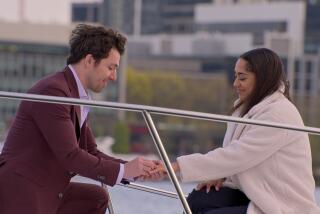PRACTICING ‘SAFE’ ADVERTISING
- Share via
Just how daring are big advertisers in the 1990s when it comes to controversial TV shows?
The Comedy Central cable network is about to find out when it runs an all-gay comedy special on Friday called “Out There” that features gay stand-up comics, a folk singer and skits.
So far, the only sponsor for the one-hour show is Out, a gay-oriented magazine, which says its spots will be the first specifically gay-oriented commercials ever to run on national television. “It’s not early, but it’s not too late” to get other sponsors, said Tony Fox, a spokesman for the network, whose sponsors include such giants as Pepsi, Budweiser, American Express and AT&T.;
Television, especially cable, has become much more likely to take risks on the content of shows than when the TV show “Soap”--which included a gay character--was boycotted by advertisers in 1977. But ad agency executives say few if any mainstream advertisers are likely to sign up for “Out There.” Furthermore, many advertisers who run spots at unspecified times on Comedy Central will demand to not appear during the show, executives predict.
“I can’t imagine any advertisers that would want to sponsor this type of show,” said Sharon Magee, cable television manager for Advanswers Media Programming in St. Louis, Mo., a division of ad agency Wells Rich Greene that buys air time for advertisers including Ralston-Purina and Heath candy bars. “They would just be asking for problems.”
She says that although most big advertisers have little choice but to be on some shows that are at least slightly risque, many companies dread getting complaint letters and phone calls. Letter-writing campaigns and consumer boycotts have been organized by groups such as the Rev. Donald Wildmon’s American Family Assn. in Tupelo, Miss., against shows including “Beavis and Butt-head” on MTV and “NYPD Blue” on ABC.
Some advertisers boycotted another recent Comedy Central special, called “Drive-In Reviews,” in which two commentators reviewed violent B-movies. On the other hand, some advertisers, including Barq’s root beer, “love to be associated with projects other advertisers won’t touch,” Fox says.
Miller Brewing, a major beer advertiser, whose guidelines rule out shows with underage drinking, gratuitous sex and violence, is on “Beavis and Butt-head” but not on “NYPD Blue.”
“We purchase ad time to reach a wide and diverse audience, not to support any viewpoint expressed or the content of a specific program,” said Eric Kraus, a Miller spokesman.
Most mainstream advertisers have chosen not to advertise in the first few months of “NYPD Blue,” the controversial but highly watched police drama. But some have agreed to start next year. The show is a relative bargain at $115,000 per 30-second spot. So far ads have been aired by movie studios and some health and beauty aid companies, which tend to be liberal in choosing shows, as well as diet products, fragrances, publications, Sharp Electronics and H.I.S. jeans. This month, Volkswagen became the first auto company to advertise.
“It’s a show that has been recognized for its dramatic excellence,” says Volkswagen spokesman Tony Fouladpour, adding that the company got only six phone calls with complaints. “It’s a good medium for showcasing our new products.”
Some advertisers are avoiding “Beavis and Butt-head,” especially since an Ohio woman said fire scenes in the show led her son to set a fire that killed her 2-year-old daughter. But that show has also attracted plenty of movie studios and some small advertisers as sponsors.
As for “Out There,” advertising executives point out that an increasing number of big advertisers appear in gay-oriented publications. For instance, Out magazine carries Apple Computer and Philips Electronics ads, and The Advocate carries Evian and Miller Lite. Executives add, however, that advertisers will be much less likely to appear on a gay-oriented TV show.
More to Read
The biggest entertainment stories
Get our big stories about Hollywood, film, television, music, arts, culture and more right in your inbox as soon as they publish.
You may occasionally receive promotional content from the Los Angeles Times.










